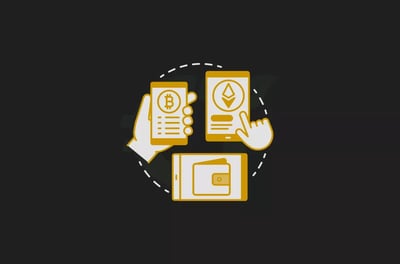Table Of Contents
Types of Crypto Wallets and How They Work
As cryptocurrency users search for the best ways to store their precious crypto investments, more types of crypto wallets have emerged, each taking a slightly different approach to safety and utility. This technological evolution has led to a situation in which crypto users are spoiled for choice. Each crypto wallet has its own combination of safety and convenience features. The wallet you choose, in the end, depends on what you find important in a wallet. In this article, we will explain how crypto wallets work and what you need to consider before deciding which way to go.
A crypto wallet stores your private keys and allows you to send or receive digital assets securely on the blockchain.
Hot wallets are connected to the internet and convenient for frequent trading, but are more vulnerable to hacks.
Cold wallets are offline and better for long-term storage of large funds with stronger protection from online threats.
Hardware wallets offer strong offline security using USB-like devices, but can be permanently lost if damaged or misplaced.
Paper wallets are outdated and limited to single-use scenarios and are risky due to easy loss or duplication.
Mobile wallets are great for on-the-go trading with QR code convenience, but still carry exposure to online attacks.
Custodial wallets are managed by exchanges and are easier for beginners, while non-custodial wallets give users full control with more responsibility.
Choosing the right wallet depends on how often you trade, how much you store, and how comfortable you are with managing private keys.

What Is a Cryptocurrency Wallet?
A cryptocurrency wallet is a facility that allows you to store your cryptocurrencies. It is named a wallet because it serves the same storage function that a physical wallet performs. However, cryptocurrency coins are stored in the form of private keys, which are long and complex alphanumeric strings of information that denote ownership of crypto funds.
One thing to remember is that crypto wallets need only be used by investors who buy the actual crypto coins, meaning they own the underlying asset. If you invest in crypto through Contracts for Difference (CFDs) then you don't need to think about how to keep crypto safe.
Just like the old legal saying, “Possession is nine-tenths of the law,” in crypto terms, it simply means that if someone gets access to your private keys, they have control of your crypto assets. Therefore, users pay special attention to where and how they store crypto private keys.
How Does a Cryptocurrency Wallet Work?
As we have mentioned, crypto wallets are not actual wallets, but rather they are hardware or software tools that have been developed to keep crypto private keys, thus allowing the user to access their assets on the blockchain. You may already know that a blockchain is a decentralized ledger over which crypto users transfer coins by means of unique alphanumeric keys. Blockchain is a vital tool in the crypto universe, and its unique safety aspects are helping public trust in digital currencies increase so that crypto can become mainstream.
Crypto traders can manage their crypto assets and execute transactions via their wallets. In its most basic form, a crypto wallet holds a set of public cryptographic keys and a set of private cryptographic public keys. These can be used to verify who owns the assets. They can also be used to either spend or receive cryptos.
Public keys permit other parties to make payments into the public key. So, if you share your public key, it is like sharing your bank details so others can pay you, whereas your private key contains the functionality that allows you to pay others. When funds leave your account via your private keys, they must be signed out, providing a layer of safety. This process differs per wallet type, as we will discuss later.
Sending cryptocurrency via your private key is simple. You simply input the destination wallet’s public key and send the amount of funds you wish to send, after signing the funds out, of course. Crypto insiders envisage a situation where you will one day be able to pay for daily utilities, like coffee or bus fare, using your crypto wallet. Of course, this situation can only become a reality when worldwide regulators greenlight the widespread legal usage of these digital currencies. Whether crypto becomes legal tender will also be something that central banks will have a say on. When receiving crypto, the process is reversed. As your public key can be shared freely, anyone can send you funds from anywhere on the blockchain.
Recommended Brokers
Types of Crypto Wallets
There are many different types of wallets, with subtle new functionalities being included as technology advances.
Hot and cold wallets
Hot wallets and cold wallets are differentiated by whether the wallet is connected to the internet. Hot wallets are Internet-enabled and are, therefore, constantly online. This is often useful for users who are active investors who need to receive and send funds all the time. However, this type of wallet is vulnerable to hacking, as was the case in 2019 when Binance’s hot wallet was hacked, affecting over 7,000 bitcoins, which was worth roughly $41 million at the time.
Hot wallet security can be enhanced through multi-signature functionality, which means that multiple parties, not single parties in the earlier versions of crypto wallets, must sign off transactions before funds leave the wallet.
By contrast, cold wallets are not connected to the Internet and, therefore, pose fewer security risks. They are also less user-friendly. Your private keys are stored offline and are safer from the most common crypto scams. Cold wallets are used to store large amounts of crypto for long periods of time.
Hardware wallets
Hardware wallets are USB-type devices that store your private keys. These devices are not much different from commercially available flash drives that store your family photographs. However, they are more durable and have extra security features, like only being accessible through native desktop apps. One major drawback of hardware wallets is that they are not especially useful when it comes to reacting quickly to crypto bull and bear runs, for the simple fact that you must locate the hardware wallet from its storage spot to enact your crypto trading strategy.
Naturally, hardware apps come with other risks. Chief among them is the risk of damage or loss. If this happens, you lose your funds, because once your private keys disappear, you have no recourse. In 2013, a UK man lost about 7,500 bitcoins on a device he mistakenly threw in the trash. His coins were worth hundreds of millions of dollars at the time. He sought permission from his local council to search a garbage dump he thought contained the discarded hardware wallet. The council rejected his requests to look through the landfill, citing environmental concerns.

Paper wallets
This type of wallet features a printed QR code on a document that constitutes a wallet. One major flaw of a paper wallet is that it is meant for a single use. This means you cannot send part payments. Additionally, this type of wallet is vulnerable to loss, damage and duplication. Paper wallets are some of the earlier forms of cold wallets, but, as technology improved, they became less common.
Mobile wallets
Mobile wallets are software wallets created for smartphones. With the rise in mobile trading based on always-on Internet connectivity, this is a natural evolution in crypto wallet technology. As with all internet-based wallets, they are vulnerable to attacks, despite having solid encryption features. However, they are very convenient because not only do users get to transact on the go, but mobile wallets have handy features like QR codes that make transacting easier.
Desktop wallets
These types of wallets can be installed as software on your desktop. They come with state-of-the-art security controls and must work in conjunction with high-grade anti-virus systems. While desktop wallets are not necessarily connected to the Internet, they are still located on an endpoint that can be accessed by hackers. Desktop wallets are easy to use and provide a good level of privacy and security.
Web wallets
These wallets, as the name suggests, can only be accessed by internet browsers. This is known as the least secure type of wallet. They differ slightly from hot wallets in that they are designed specifically for convenient trading of small amounts of funds. They work best with small investments and allow for quick transactions.
Custodial and Non-Custodial Wallets
In a constant attempt to offer more variety and convenience to users, wallet developers have splintered wallets into two different forms. These are custodial wallets and non-custodial wallets.
Custodial wallets
The majority of crypto wallets are custodial wallets. This means that the user hands over custody of the wallet to their crypto exchange or another third party. As crypto exchanges try to lock-in their clientele, they offer increasingly safe and convenient ways to take the fuss out of private key storage. Newcomers, upon engaging with a crypto exchange, are often faced with the choice of whether to go with a custodial wallet or a non-custodial wallet. Knowing the dangers of losing their private keys, newbies often go the custodial wallet route.
The term custodial is derived from the fact that the crypto exchange takes total control of the user’s tokens. This convenient form of storage removes the trouble of keeping the private keys safe and out of the hands of the user and transfers it to the crypto exchange. The understanding is that the exchange has the industrial grade safety infrastructure required to do a better job of keeping coins safe.
Users who choose this route must live with having to go through two-factor authentication, email confirmation, and biometric authentication when they need to perform transactions. It may be a hassle up front to establish these security measures, but, once it is done, the user feels comfort that they will always be in charge of their biometric information, which is much easier than keeping valuable private keys.
Rather than leave all the user’s funds in a custodial wallet, many exchanges take additional security measures and transfer some funds to the company’s cold wallet, ensuring another level of safety. If hackers manage to breach the company cold wallet (highly unlikely), the most progressive exchanges are starting to offer insurance of consumer funds, safe in the knowledge they may never need to use it.
Non-Custodial wallets
Non-custodial wallets remain under the full control of the user. The onus is on the user to maintain safety and security. If they choose to utilize a non-custodial hardware wallet, they must ensure that it is kept in a safe location, such as a safety deposit box.
Naturally, this high burden of security is something with which the average user prefers not to be saddled, which explains why so many users go the custodial route. For non-custodial wallet holders, you will often be asked to keep a list of 12 "recovery" or "seed" words, which are randomly generated. This is a common recovery method for those who lose their device.
As we have mentioned before with the “possession is nine tenths of the law” analogy, whoever has the recovery words controls the funds in the wallet. This is the main downfall of any system that relies on the diligence of the user: it is not uncommon for humans to make simple errors, like printing their seed words and storing them in a place where they can be found.
In the same way that if you lose your private keys, you lose your funds, if you misplace the recovery words, you may never see your crypto investments again. Non-custodial wallets can be hardware-based, such as the USB device, or non-hardware-based in the case of wallets that are native to the crypto exchange that offers them.
The Bottom Line
There are many ways to store your crypto keys. We have discussed the main methods. As technology improves, perhaps more will come online. For now, however, there is ample choice for any type of trader. Be sure to read up on which wallet will best suit your needs and remember that you can always change wallets if you notice the one you chose is not serving you.
FAQ
Before deciding among crypto wallets, spend some time thinking about elements like ease-of-use and safety. What are your priorities? How easily accessible do you want your crypto to be? Only by going through this exercise will you be able to decide which wallet is best for you, as they all have their distinct strengths and weaknesses.
Everybody is different. If you often lose passwords and devices, then a custodial wallet might be the way to go, since an exchange or custodian is likely to have better security measures and backup options. There is nothing as frustrating as trying to recover lost passwords every time you misplace your wallet. This is a popular option for beginners. On the other hand, if you are in complete control of your valuables at all times, you should probably choose a non-custodial wallet.
Unlike physical wallets, crypto wallets technically don’t store your crypto, but instead, they keep your private crypto keys, which is the only method by which you can access your crypto holdings that live on the blockchain.
A public key is similar to your physical home address. It verifies that you are the owner of a public address that can send and receive cryptocurrency.
A private key acts like a password for cryptocurrency wallets. It allows users to access their crypto wallet to buy, sell and monitor their digital currency. This password is like an online bank account that allows you access to your funds.
Settling on the type of wallet to use depends on a variety of considerations, including how often you trade, what you trade, your stance on security, and your position on cost. It is also vital to take into account what the crypto wallet can do and what its capabilities are. Crypto wallets are definitely not one size fits all. You need to have answers to several important personal questions before you can decide which one is best for you.






